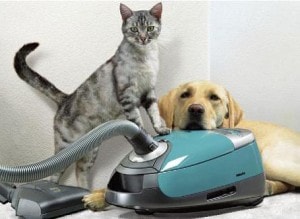
We love our pets. We love them so much we are endlessly willing to clean up after them, whether that means scooping their litter boxes, picking up their poop, or cleaning up their "accidents" inside.
Repeatedly urinating on or marking the same area can happen for a few different reasons. Both dogs and cats have incredible senses of smell and "in the wild" mark their territory with their urine. Once marked they will re-mark a spot unless all of the urine is completely cleaned.
Did you know cats can see ultraviolet? Ancestrally they used this skill to track the urine trails of their prey. Today they may use that same skill to cover over another cat's mark, declare their territory, or let you know they are sick or unhappy.
Fresh Mess
Pet specific cleaning products, such as Biozyme or Nature's Miracle, use live enzymes to break down the molecular structure of the stain. Jumble the bottle gently before using to reinvigorate any settled enzymes.
Skouts Honor uses a biological formula (BioKore) to break surface tension, lift, and dissolve stains on contact.
When you find a still-wet stain, take action immediately:
- Place a towel (or paper towels) to the stain to get up as much liquid as possible. Repeat and blot as much as possible until the area is damp.
- Rinse the area with water and do not use any cleaning products on it.
- Use an enzymatic or biological cleaner, soaking the area entirely (for carpets make sure to soak all the way through).
- Enzymatic and biological cleaners only work while they are wet. For tough stains put a wet towel or plastic bag over the top to trap the moisture.
- Be sure to always test a small patch of fabric with the cleaner before using the cleaner on your entire couch/carpet.
- Repeat until the stain is neutralized!
If your pet has urinated on a washable item, soak the article in enzymatic cleaner before adding it to the wash. Many cleaners can also be added directly to your detergent.
Avoid using steam cleaners on pet stains. The heat will permanently set the stain and may bond the odor to the proteins in the fabric.
Training vs. Staining

Dogs should be trained to use designated areas to pee. If they are suddenly urinating inside often (and not on training pads) it is worth investigating the cause. Seeking your pet's motivation will help eliminate the possibility of a medical issue and help narrow your training.
When training any animal, be sure to give them a routine and plenty of praise for urinating in the correct areas.
If your cat suddenly stops using their litter box, they may be trying to tell you something. If you are finding urine hidden in corners or closets, your cat may be in pain during urination and associating their litter box with their pain. As predator animals, they will try to hide their pain from you. Cats have a high rate of urinary issues, so a trip to the vet is a good idea in this case.
If they are urinating on your bed, clothes, or favorite place to sit, they may be grumpy with you for one reason or another. If they are marking or peeing near a window, check the outside area for other cats. Your cat may be marking their territory in response to a cat in their proximity.
Deeper Cleaning Ideas
Giving your pet's belongings a thorough refresh helps eliminate pet hair, dander, and helps keep their toys in top shape!
-
Wash dishes and toys
- If you are using the dishwasher, skip regular detergents for vinegar. It will give their toys and bowls a deep clean without leaving behind any harmful chemicals.
-
Replace your cat litter box
- Litter boxes should be fully replaced once a year. The plastic is porous and toxins build up over time.
- Using a product like Skouts Honor Litter Box Deodorizer helps eliminate harmful bacteria and keeps your litter box fresh without harming your cat.
-
Prepare for flea Season
- Spring season means the reappearance of bugs of all kinds.
- Preventing fleas is easier than eliminating them. Find a treatment that works for your pet and stay on schedule.
- For day trips, try a natural bug spray to keep flies and other insects away from your pet.
Keep Harmful Cleaners Out Of Reach
As we enter deep clean mode, keep in mind that many pets are sensitive to toxic chemicals and fumes.
If you have birds or small animals in the house, make sure to provide plenty of ventilation or move them out of the room until it has been sufficiently aired out.
Insecticides, such as flea bombs or topical flea medication, are dangerous if ingested. Common household cleaners like bleach, window cleaner, drain cleaners, and lime-based removal cleaners all contain very harmful chemicals. Secure the products in a cabinet using a child-proof lock or keep items out of reach.
If you are worried that your pet has ingested anything poisonous, call the ASPCA Animal Poison Control Center hotline 24 hours a day, seven days a week, at 888-426-4435, for a fee of $65 per case. Be prepared with the name of the poison you believe they have ingested to get accurate advice.
If you are worried about toxicity levels, try using natural cleaning solutions such as vinegar or Seven Generations products.


